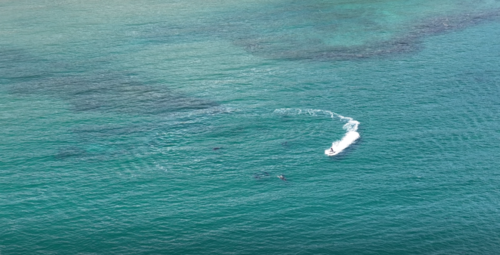
An increase in risky, potentially harmful encounters with marine mammals is prompting a call from Department of Conservation to the public to give dolphins and whales space on the water.
DOC’s Marine Technical Advisor, Hannah Hendriks says DOC has received numerous complaints from the public about boaties and jetskiers getting too close to marine mammals.
“This is something we see every summer, but more people seem to be aware of the rules these days and are contacting DOC when they observe inappropriate behaviour.
“We are often getting several complaints about the same interactions – showing people understand the rules and care about reducing our impact on these animals.
“One of the complaints we are seeing is about crowding of dolphin pods, especially in small, shallow bays. We want these animals to be able to behave naturally and move away if they want to without being chased”, says Hendriks.
All seals, sea lions, dolphins and whales are protected under the Marine Mammals Protection Act 1978. It’s an offence to harass, disturb, injure, or kill marine mammals.
Offenders could face a maximum penalty of two years imprisonment or a fine to a maximum of $250,000.
Hannah Hendriks says although it is exciting and interesting to come across marine mammals in the wild, the Marine Mammals Protection Regulations 1992 states how people can safely interact with them.
“These rules are for the safety and protection of the animals, which may have young with them, and may also help ensure the safety of members of the public. It doesn’t take much to go wrong for there to be disastrous consequences when it comes to larger whales.
“Regulations pertaining to speed, direction, and approach of vessels are ultimately about being predictable. Dolphins are excellent at manoeuvring in water, but mistakes can happen.
“If you are travelling at speed, and making sudden turns, it is harder for dolphins to predict what you are going to do and keep out of harm’s way. This can cause vessel strike injuries that can kill or severely injure animals.
“Young animals are particularly at risk as they may not be as nimble or may not have learned how to interact safely with vessels.
“The risk is even greater when there are many boats and jet skis operating in one area. The amount of underwater noise produced can disrupt their ability to communicate with each other and cause confusion and stress. This all results in an increased risk of vessel strike and mothers and calves being separated,” says Hendriks.
Interacting with pods can disturb their natural behaviours like resting, feeding, and socialising which can have long-term impacts on survival and breeding success. Repeated disturbance may lead to animals avoiding an area.
For whales, including orca and pilot whales, the rules require people to be extra cautious and keep further away.
Boats and kayaks should keep 50m away from whales (including orca and pilot whales) and this distance should be increased to 200m if calves are present. Swimming is also prohibited with whales and orca.
Keep boats in neutral gear if possible and avoid sudden changes in speed and direction.
“If animals are avoiding you, let them move on without chasing them. If whales approach you, move away carefully if you are able, otherwise reduce speed and put your engine into neutral until they move away or you can safely depart.
“We have investigated offences in which people have ignored these rules.
“DOC has a range of enforcement options available, starting at education, advocacy and moving towards formal warnings, infringement notices, and prosecutions. We treat all reported incidents very seriously,” says Hendriks.
Concerning behaviour involving marine mammals can be reported via 0800 DOCHOT (0800 362 468), with as much detail as possible such as images or video, descriptions of persons, boat names or vehicle registrations. This enables DOC to follow up with anyone involved.
More information and guidance on interacting with marine mammals can be found on DOC’s website: Sharing our coasts with marine mammals (doc.govt.nz) and you can report your marine mammal sightings via our online form: Marine mammal sighting form: Conservation (doc.govt.nz)







